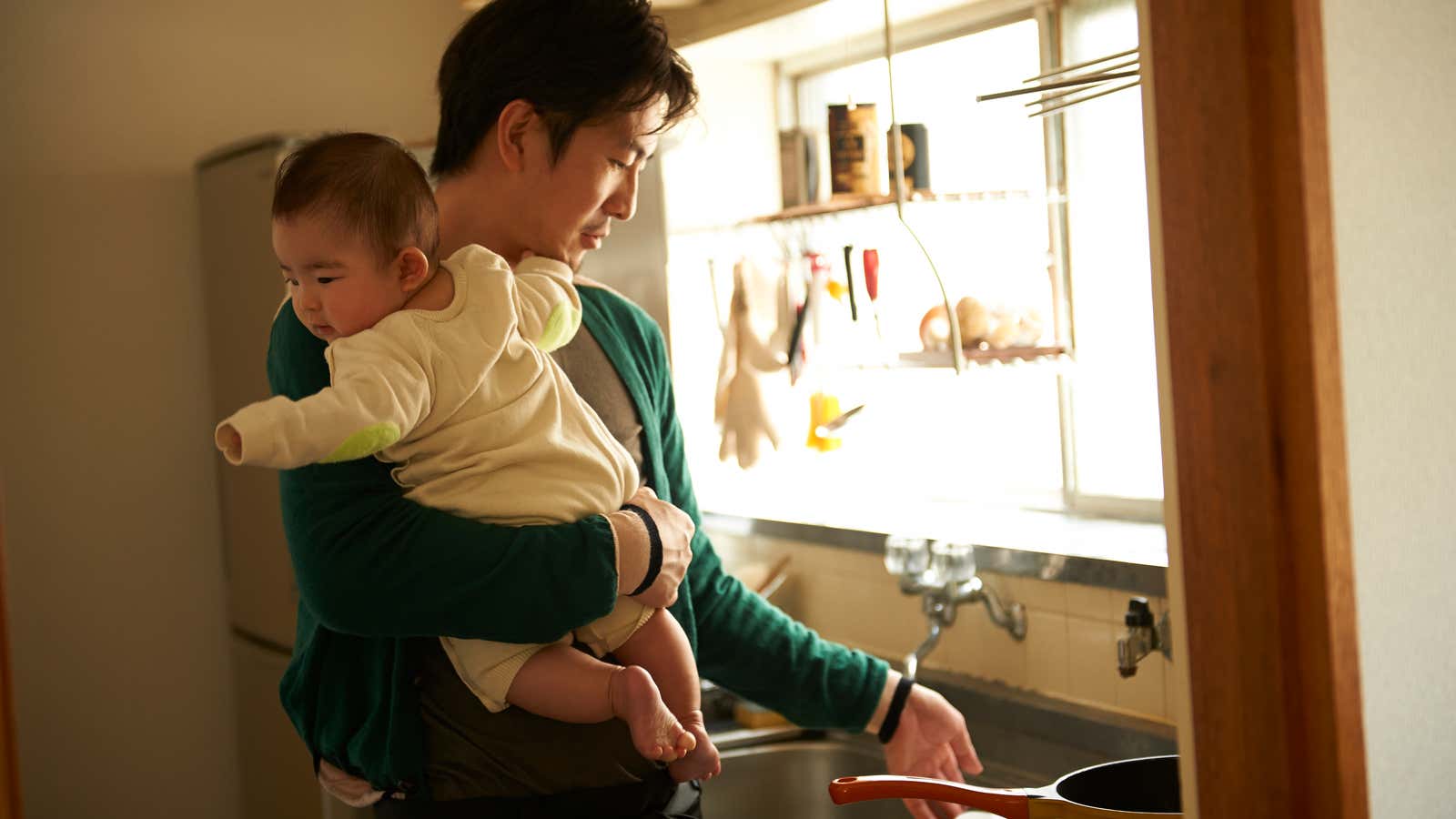It’s happening: Working dads are starting to grasp that when you’re maxed out at home, it’s not easy to be a star around the office.
At least that seems safe to extrapolate from the findings of a recent global survey by Boston Consulting Group. It found that in late 2020, caregivers (whether looking after kids or older parents) reported feeling more angst about their well-being than those without any dependents at home. More narrowly, parents with children under age 12 experienced greater stress than those with older children.
The US-only data showed that men who were parents were also slightly more likely than women to agree with statements like “I am worried about my future in my company,” and “I believe I am at a disadvantage compared to my colleagues who are not parents.”
Matt Krentz, the senior partner at BCG who led the survey, found that ironic, considering that it’s still women who shoulder the heavier caregiving load in terms of actual tasks and mental housekeeping—the remembering of doctor’s appointments, play dates, and homework. “I don’t think they have had to deal with this before,” Krentz says of men. Now that they see it, he adds, “they are worried about their own careers.”
Feeling that your future is in jeopardy, a concern reported by a third or more of all caregivers, can be a sign of burnout, a syndrome marked by exhaustion and caused by unrelenting stress. Parents and other caregivers were already at risk of burning out before the pandemic made everything harder. Now women, in particular, are leaving the workforce at alarming rates.
How workers can help their colleagues facing burnout
Journalist Olga Khazan argued in a recent piece for the Atlantic that only your boss can relieve your burnout—by adjusting your workload, giving you the autonomy you need to work flexibly, and offering the recognition that helps you feel valued. Indeed, the problem is too big to be solved by meditation apps and self-care routines on their own.
Krentz’s experience suggests that not just managers but entire teams of co-workers may need to pitch in on this effort. His team at BCG holds a weekly meeting that’s strictly about how everyone is working together. People choose an image and a phrase that explains how they’re feeling, from “I’m feeling great” to “I’m in a bad way.” Krentz says that two weeks ago, a project leader who is expecting her first child told the group, “Actually, I’m not in a great place. My doctor told me I’m at some risk. I’m trying to figure out how I balance that and work.” That made it easier for another woman to share that she was feeling low because her teenage daughter was struggling at school and that it was putting pressure on her because her daughter didn’t have other social outlets.
Together the group decided to really hold each other to ending the day at 5pm, and to stop emailing each other in the evenings.
A collective approach like this makes sense for any company that relies on collaboration (a.k.a., every organization). We know that the attitudes of our teammates matter. You can have the most sincere and understanding manager and still feel the scorn and judgment of the group. Imagine if you are already feeling burned out, or if you’re the boss and could use your whole team’s understanding.
Not everyone will appreciate being asked about their feelings at work. And, “Yes, there would be things that people don’t want to share,” says Krentz. “Maybe they’re something they’re dealing with that’s personal, in their family or a parent who’s sick, and I think that’s perfectly fine.” On the other hand, he’s convinced of the value in asking about the constraints within someone’s day and finding suitable accommodations.
Companies benefit when they support caregivers
Long after schools reopen, parents will still be dealing with overloaded schedules and conflicting demands, just as they were before the pandemic, and more adults in developed economies will have to care for aging parents. For caregivers who are people of color, the exhaustion of living with and fighting against racism creates extra burnout risk, heightened now by the disproportionate impact of Covid-19 and a steady drumbeat of white supremacist violence in countries including the US, where Asian and Black Americans have been targeted.
The BCG report lists several interventions—reducing workloads, reducing hours while providing full-time pay, providing paid and unpaid leave of absences—that companies can introduce to support caregiving employees. It also recommends having open and frequent discussions about workloads and factoring caregiving status into an evaluation, as some of the stress caregivers feel comes from watching other people step up during the pandemic in ways that are not realistic for parents and others, Krentz says. (It should be noted that caregivers of people who are ill—whether children, siblings, parents, or spouses—are also at risk of a specific type of caregiver burnout that can affect a person’s health and job performance.)
At one time, companies weren’t asked to pay much attention to these complicating factors in their employees’ lives. Caregiving issues weren’t seen as a corporate problem to solve. Now we know that more empathetic workplaces are also more inclusive, therefore good for innovation and the bottom line. When people feel that goodwill and support is reciprocal, that others have their back, Krentz believes, morale and productivity will rise together.
